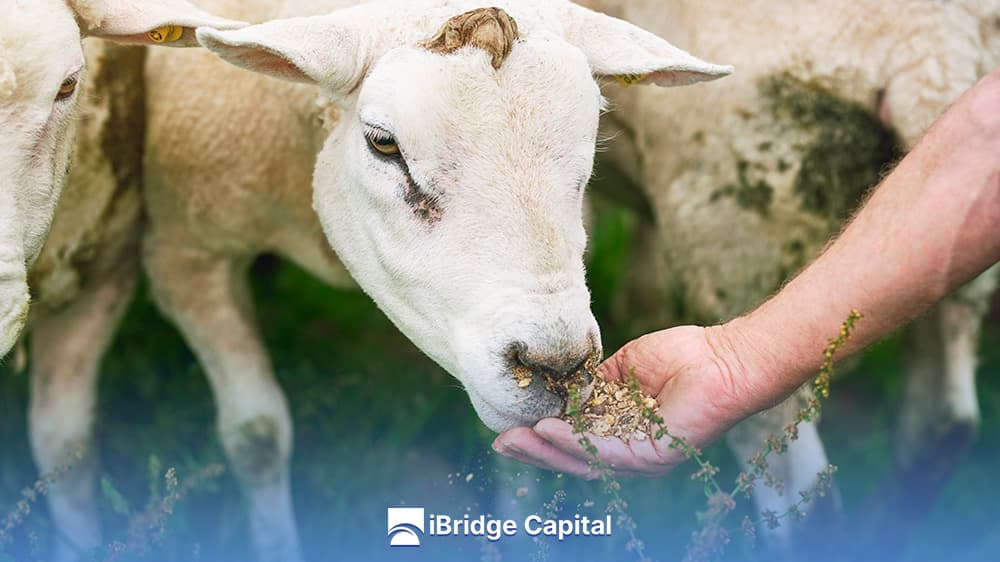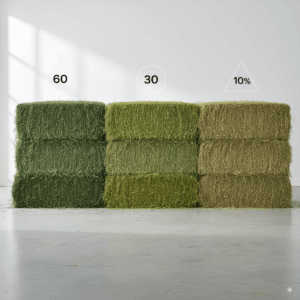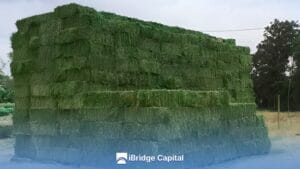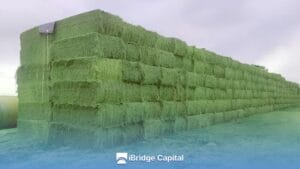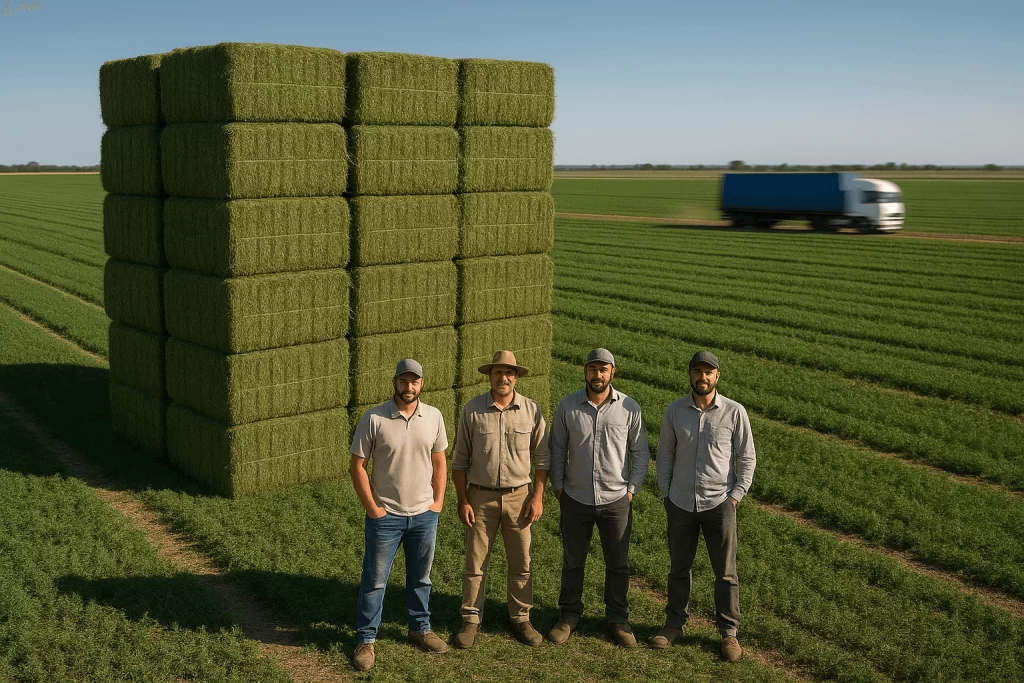In the world of livestock production, animal nutrition is the difference between a profitable business and one that isn’t. Producers are constantly looking for ways to optimize their animals’ diets, and one of the most effective and versatile solutions is alfalfa meal diet.
This product, derived from one of the most nutritious forage plants in the world, offers a concentrated way to improve health, growth, and productivity. Its use extends to various species, from cows and horses to poultry and rabbits.
What Is Alfalfa Meal and Its Nutritional Value
Alfalfa meal is the result of grinding and processing the alfalfa plant, scientifically known as Medicago sativa. It’s produced from the entire plant or just its leaves and stems. Alfalfa is recognized as the “Queen of Forages” for its high nutritional value.
This forage, once ground, concentrates all its benefits into a format that’s easy to store, transport, and mix with other dietary ingredients. The meal is a versatile option that can be used to supplement diets based on grains or lower-quality forages.
The benefits of alfalfa meal come from its rich composition. It’s a food that not only provides energy and protein but also a large amount of vitamins, minerals, and fiber. It is often used as a nutritional supplement for animals in high-demand life stages, such as growth or lactation. Its digestibility by ruminants makes it a very popular choice for livestock feeding.
The Composition of Alfalfa Meal
The composition of the alfalfa meal is what makes it so valuable. Its nutritional value is superior to many other forages. It contains around 17-20% crude protein, a higher level than many grasses. It’s rich in fiber, which helps with the digestive health of animals. Additionally, it’s an excellent source of calcium, a vital mineral for bone development and milk production.
It also contains a large amount of essential vitamins, such as vitamins A, D, E, and K, as well as B-complex vitamins. These nutrients are key for a strong immune system and overall well-being. Alfalfa meal is a source of carotene, which is converted into vitamin A in the animal’s body, making it a very complete protein supplement for livestock.
The Difference Between Alfalfa Meal and Alfalfa Hay
A common question is whether the meal is the same as hay. They are not. Alfalfa hay is the dehydrated plant in bales, which is primarily used as forage. Alfalfa meal, on the other hand, is ground alfalfa converted into a powder. This difference in form allows it to be easily mixed into concentrated feed rations.
The meal also has a higher level of digestibility. When alfalfa is used in livestock feeding in meal form, animals can digest and absorb the nutrients more easily. Dehydrated alfalfa, which is alfalfa that has been quickly dried to retain its green color and nutritional value, is often used before being ground.
Key Benefits of Alfalfa Meal for animals’ diet
Alfalfa for livestock is one of the most effective solutions for improving productivity. Its high content of protein, energy, and minerals makes it a key ingredient in animal nutrition. It’s especially useful during times of the year when pasture forage is scarce or of low quality.
Producers who are looking for how to improve their animals’ diet often turn to alfalfa meal for its effectiveness.
Alfalfa meal for cattle has been shown to be an efficient way to improve rumen health. Its fiber promotes chewing and salivation, which helps maintain a stable pH in the rumen. This is vital to prevent acidosis, a common condition in high-production livestock that consumes diets rich in grains.
A High-Quality Protein Supplement
The high protein content of alfalfa meal makes it an excellent protein supplement for livestock. Protein is essential for muscle growth, fiber development, and milk production. Using alfalfa meal in animals is a way to supplement diets that have a protein deficiency.
For example, alfalfa meal for fattening cattle is used to increase the animals’ muscle mass. Alfalfa concentrate is used to provide the extra energy and protein that animals need to grow quickly. The protein in alfalfa is high-quality and very digestible, making it one of the best options on the market.
Source of Vitamins, Minerals, and Fiber
In addition to protein, alfalfa meal is rich in vitamins and minerals. Its high calcium content is especially useful for lactating animals, as calcium is vital for milk production. The properties of alfalfa meal also include fiber, which is crucial for the digestive health of animals. Fiber helps regulate intestinal transit and prevents problems like diarrhea and constipation.
Using alfalfa as a supplement is a safe and natural way to provide these nutrients to animals. Its inclusion in the diet can reduce the need for synthetic supplements, which is a plus for producers looking for a more natural feeding approach.
Types and Formats of Alfalfa Meal
Alfalfa meal is available in various formats, which makes it versatile and easy to use in different production systems. Dehydrated alfalfa is the most common form, and it can be found in powder or pellet form. Each format has its advantages, and its use depends on the type of animal and the feeding system.
Dehydrated forage has the advantage of preserving for a longer time and having a lower risk of mold and bacterial contamination. It’s produced by quickly drying alfalfa in ovens, which preserves its nutrients and color.
Dehydrated Alfalfa and Its Properties
Dehydrated alfalfa is alfalfa that has been quickly dried to retain its nutritional value. This process ensures that the alfalfa retains its green color, vitamins, and proteins. Alfalfa meal can be made from dehydrated alfalfa. This product is very nutritious and can be used in the diet of almost all animals.
Pelletized alfalfa meal is another very popular format. Pellets are small cylinders made from alfalfa meal that are compacted under high pressure. This format has the advantage of being easy to store, transport, and mix with other ingredients.
Use of Pelletized Alfalfa in Animal Feeding
Pelletized alfalfa is the most common way to use alfalfa meal in animal nutrition. The pelleting process increases the density of the feed, which reduces storage space and transportation costs. Alfalfa pellets for livestock are very popular for this reason.
The price of alfalfa pellets is often more competitive than that of the meal. Pellets are also easier to feed to animals, as they can be mixed with grains or simply fed in a trough. The use of pelletized alfalfa in animal feeding is a very efficient way to provide alfalfa nutrients to farm animals.
Alfalfa Meal in the Diet of Different Animals
Alfalfa meal is not only used in cattle feeding. It is also a valuable ingredient in the diet of horses, rabbits, chickens, and pigs. Each species has different nutritional requirements, and alfalfa meal can be adapted to their needs.
Alfalfa meal for horses is an excellent source of fiber and protein and helps with digestive health. The benefits of alfalfa for rabbits include good digestive health and a source of high-quality fiber.
Alfalfa for Beef and Dairy Cattle
Alfalfa meal in the diet of cows is very common alfalfa for dairy cows is an excellent source of protein, calcium, and vitamin A. It is used to improve the quality and quantity of milk produced. With the addition of alfalfa meal, producers can improve milk quality with alfalfa and increase the profitability of their business.
Alfalfa meal for dairy cattle is mixed with other ingredients, such as grains and concentrates, to create a balanced ration. The fiber in alfalfa meal helps the cows’ rumen health, which translates into increased milk production.
Benefits of Alfalfa for Rabbits and Horses
The benefits of alfalfa for rabbits are many. Alfalfa is an excellent source of fiber, which is essential for the proper functioning of their digestive system. It is also rich in proteins and calcium, which are crucial for the growth of young rabbits. Feeding rabbits with alfalfa meal is a safe and natural way to give them the nutrients they need.
Alfalfa in the diet of horses is very popular. Alfalfa is a source of high-quality protein and calcium, which helps with muscle and bone development. It’s used for young horses, sport horses, and pregnant mares. The benefits of dehydrated alfalfa for horses include a reduction in dust in the diet and a safe and consistent source of nutrients.
How to Use Alfalfa Meal in Production
The way alfalfa meal is used varies depending on the type of animal and the production goal. It’s important to know how to use alfalfa meal in the diet and in what quantities. Incorrect use can cause health problems.
Alfalfa meal for livestock can be mixed with other ingredients or simply given as a supplement. The recommended dose depends on the animal’s weight, age, and production stage.
Recommended Dosage and How to Avoid Mistakes
The recommended dose of alfalfa meal for cows varies. A dairy cow can consume between 2 and 4 kg of alfalfa meal per day, depending on the quality of its forage and the amount of milk it produces. It’s important not to give too much alfalfa, as its high calcium content can cause health problems. It’s a common mistake to think that more is better.
The use of alfalfa meal in the diet of pigs also requires careful dosage. Alfalfa meal for pigs is used in small amounts to provide fiber and vitamins. If used in excess, it can reduce feed efficiency. How to give alfalfa to pigs must be gradual and controlled, the use of alfalfa meal for pigs is more like a supplement than a main feed.
The Importance of a Balanced Diet in Animal Nutrition
The use of alfalfa meal should be part of a well-balanced diet. It is not a complete food on its own. It’s important that it’s mixed with other ingredients, such as grains and forages, so that the animals receive all the nutrients they need.
Lower-quality forage for livestock, such as straw, can be supplemented with alfalfa meal to increase its nutritional value. The use of alfalfa meal in livestock feeding is done strategically to reduce feeding costs and improve animal health.
Final Considerations and Conclusions
Alfalfa meal is a very useful product for any producer looking for how to improve their animals’ diet. Its high nutritional value, versatility, and benefits for animal health make it a key ingredient in animal nutrition.
The price of alfalfa meal is often higher than that of other forages. However, the benefits it provides in terms of productivity and animal health justify the investment.
Price and Economic Considerations
The price of alfalfa meal varies according to quality and format. Alfalfa meal in pellets is often more expensive than meal in powder form, but it’s easier to transport and store. The decision to use alfalfa meal should be an economic one, the cost per nutrient should be calculated and compared with other options.
The properties of alfalfa for animals are so great that it often translates into a reduction in medicine costs and an increase in productivity.
Alfalfa Meal as a Pillar in Animal Feeding
Alfalfa meal has become a pillar in livestock feeding. Its use in the diet of dairy cows, horses, rabbits, and poultry has proven effective. Alfalfa for poultry is a source of natural pigment for egg yolks and for chicken meat.
Poultry feed with alfalfa meal is used to improve the color of the egg yolk and to give a more yellow color to chicken meat. This is because alfalfa is rich in xanthophylls, a natural pigment.
Cattle feed also benefits from alfalfa meal, especially in the feeding of fattening livestock. Alfalfa for goats and alfalfa for sheep are also excellent options.
Conclusion
Alfalfa meal is a practical and effective solution to improve your animals’ diet. Its rich nutritional profile, versatility, and benefits for animal health make it an indispensable product.
If you are looking for a way to improve the health, growth, and productivity of your animals, alfalfa meal is a smart investment. We invite you to learn more about this product and consider its use in your animals’ diet.

